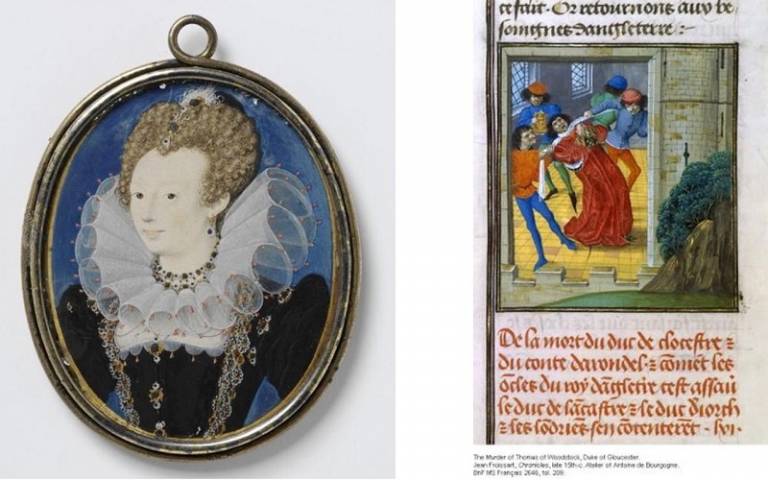MREMS ONLINE: Elizabethan performance and historical drama
17 June 2021, 5:00 pm–6:00 pm

MREMS (Medieval, Renaissance and Early Modern Studies) is pleased to host 2 papers: 'Starch stuff: searching for substance in the evidence for Elizabethan performance' with Anouska Lester (University of Roehampton) and ''Let me be chronicled': history and topicality in Elizabethan historical drama' with Joshua Mcloughlin (UCL EM English).
This event is free.
Event Information
Open to
- All
Availability
- Yes
Cost
- Free
Organiser
-
Early Modern Exchanges
This event will run on Zoom. The link to join is: https://ucl.zoom.us/j/96619143475?pwd=NVlaaHo2VHBFY1c2YkgvRWpaQU4wZz09
Starch stuff: searching for substance in the evidence for Elizabethan performance
Anouska Lester (University of Roehampton)
Starch was used for shaping ruffs and collars, and setting wigs and beards. Starch made from wheat was introduced to England from the Netherlands in the 1560s, and quickly gained notoriety. This paper examines how starch may have been used and perceived in Elizabethan performance, and, crucially, how we know given that starch is not mentioned in extant performance documents. Starch is difficult to trace: the substance is invisible when in use, only noticeable from the effect it has on fabric. The evidence for starch, and particularly its use in performance, is also near-invisible. Starch is referenced occasionally in dramatic texts: but only after 1600. And these verbal references do not necessitate a material presence. Two dramatic texts very likely featured starch in their performances: Middleton’s and Rowley’s The World Tossed at Tennis (1620) and the anonymously-authored A Merry Dialogue Between Band, Cuff, and Ruff (1615). I use these two dramatic texts to consider how starch may have been used and interpreted in 16th century performances. Does an absence of textual evidence indicate that starch was not used in Elizabethan performance? Can the use of starch be inferred from other sources? My focus on intangible starch allows me to consider how to navigate the loss and archival gaps which characterise early modern performance and its evidence.
Image: Hilliard, Unknown Woman, 1590-93 ©Victoria & Albert Museum, London
'Let me be chronicled': history and topicality in Elizabethan historical drama
Joshua Mcloughlin (UCL English)
What are Elizabethan history plays ‘about’? The answer might seem obvious but, in the work of many critics, the historical drama of the 1590s was not really ‘about’ history. Instead, scholarship has tended to see writing the past as a cipher for writing about the Elizabethan present. Through veiled allusions, coded analogies, and theatrical in-jokes, historical drama, we are told, ultimately directs our attention away from the past represented on-stage and towards extra-dramatic topicalities, such as the problem of the Elizabethan succession or the Essex rebellion.
This paper tries to read historical drama as being mainly about history. It examines how three early modern history plays—Christopher Marlowe’s Edward II (1592), the anonymous Thomas of Woodstock (c.1594), and Thomas Heywood’s Edward IV (1599)—are self-consciously engaged in what Jerome de Groot calls ‘representing and versioning the past’. In treating these plays as forms of history rather than topical, the paper shows that they contain important reflections on and of early modern historical culture.
Marlowe’s royalist, court-focussed writing of the past contrasts sharply with the rudimentary history ‘from below’ pioneered in Woodstock, whilst Heywood’s two-part Edward IV perfects a mode of civic historiography that marginalises king and court in favour of artisans, merchants, labourers, apprentices, and the wider citizenry. This paper will show that these plays are not accidentally ‘of’ but substantially ‘about’ history.
This event is organised by Early Modern Exchanges, which is part of the UCL Institute of Advanced Studies.
 Close
Close

